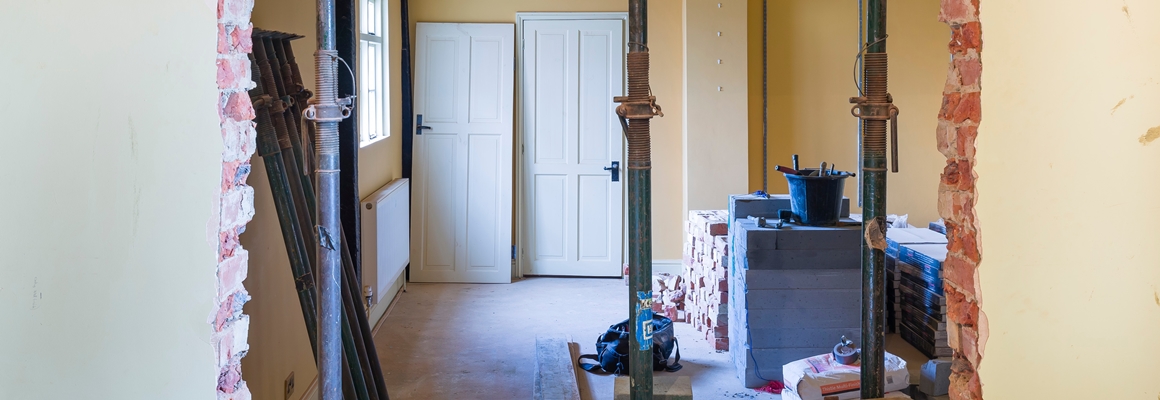You May Need Consent – Even Though It’s Your Home
Leasehold property owners can face a nasty shock when they need to make alterations to their home. Or when they’ve altered the property without consent…and then try to sell it.
You may well need to apply for permission to make alterations. That means getting written consent from the freeholder (landlord) – even though it’s your home and you’ve paid a hefty price for it.
It’s all too easy to fall foul of these rules. They can slow up urgent work – or even jeopardise the sale of your property.
Why Do I Need Consent To Make Alterations?
Leasehold property generally tends to mean flats – and whatever you do in your flat usually has a greater impact on your neighbours because they’re living in the same building.
So it stands to reason that you may not be allowed to simply knock out or move supporting walls when you want to change the layout of your rooms.
When Do I Need To Obtain The Freeholder’s Consent?
Your lease is likely to provide the answer to this question. It will be dictated by the:
- scope of the works
- wording of your lease.
Let’s examine both these considerations in more detail…
The Scope Of The Works
You may need to apply for consent from the freeholder if you plan to remove any walls. Any such proposals may need to be supported by a report from your structural engineers or surveyors.
We get a lot of these enquiries because knocking out walls to create an open-plan lounge diner is a popular option these days. But there are other reasons you may need consent:
- building an extension or adding a conservatory
- replacing windows or external doors
- installing a new central heating system.
Adding or replacing double glazing is again an obvious issue because it may impact on the structure and aesthetics of the building.
Central heating can be something that catches out some leaseholders. Picture the scene: your old boiler has suddenly broken – and spare parts are no longer available. A new boiler could involve extensive work which may affect other flats in the building – such as cutting into concrete floors and ceilings to access the old piping if it needs to be replaced.
But what started out as a simple boiler repair/replacement could suddenly become a potential leasehold issue.
If you are unsure how to proceed, get in touch with our specialist team at Coles Miller.
The Wording Of Your Lease…
The rules concerning alterations will be covered by the covenants of the lease. These fall into two types:
- Absolute covenant – which usually prevents any alterations whatsoever – this would need to be changed using a deed of variation.
- Qualified covenant – requiring the freeholder/landlord’s consent before carrying out alterations. This could be either written consent or by way of a Licence for Alterations. The Landlord and Tenant Act 1927 states that the landlord cannot withhold consent unreasonably – but that they can charge a reasonable sum to cover any legal expenses.
An alterations protocol regulates applications for consent. It is not binding but the parties should act in accordance with the protocol – or face criticism from the courts.
Making Leasehold Alterations Without Consent – When You May Not Need Approval
Your lease will almost certainly state that you have a responsibility to keep your property in good order. That means redecoration from time to time – a spot of painting, fitting new carpets. These types of works are usually permitted without the need for consent.
Upgrading a kitchen or bathroom again may not require consent – provided that you’re not moving any structural walls.
There are no fixed rules regarding the types of alterations that require consent and those that do not. You should always check your lease before carrying out alterations.
Consent For Alterations Vs A Licence – What’s The Difference?
Written consent is simply the freeholder’s permission for the work to go ahead.
A licence is a much more detailed document that outlines any conditions attached to the approval – such as how and when the project should be carried out, which contractors should be used, safety conditions, the timescale and any remediation work required. This blog post about installing electric vehicle charging points at leasehold property goes into more detail about licences.
Sometimes you may need to apply for consent and enter into a licence in exchange for the consent. Effectively, obtaining a licence may give you the consent you need. But beware, the reverse is not true – granting consent does not equate to giving you a licence!
As with so many aspects of dealing with leasehold property, it pays to get expert legal advice before embarking on any project – because to do so without obtaining the correct permission(s) can be time-consuming and costly. You may be forced to put right any unauthorised alterations that you’ve made.
Can I Obtain Retrospective Consent?
This is a question we get asked a lot. Usually by a leaseholder when their property sale suddenly hits a snag.
Perhaps they’ve moved a partition wall without permission (because their builder said it would be okay) – and now their flat’s new layout no longer matches the plans attached to the lease. The buyer’s conveyancing solicitor quite rightly spots this discrepancy and draws the vendor’s attention to it…putting the brakes on the sale process.
In this scenario, you would need either to apply to the freeholder for retrospective consent or face the cost and upheaval of moving the partition wall back to where it was before.
Some freeholders/landlords can seize on this as an opportunity to make some extra money. They’ll attempt to charge you a pretty penny for providing retrospective consent because they know that:
- your property sale depends on it
- the cost of making right the unauthorised works can be high.
How Long Does It Take To Obtain Consent For Alterations? How Much Does It Cost?
How long it takes can depend on a number of factors:
- How straightforward or complex your lease is. As with so much in residential leasehold property law, the starting point should always be the lease.
- The alterations being proposed, how complex and extensive they are.
- How reasonable (or not) the freeholder may be.
Typically, the process looks something like this (though each case is different):
- Request consent from the freeholder and outline the relevant provisions within the lease, confirming the need for consent.
- The freeholder could then do one of four things:
- grant consent (possibly with conditions)
- refuse consent for a genuine reason
- refuse consent unreasonably
- ignore the letter (or fail to reply in time). - If the freeholder has refused consent for a genuine reason, then we recommend taking further legal advice on how best to proceed – taking into account the reason(s) for refusal.
- If the freeholder has been unreasonable – or simply refused to reply – then the next step may be to seek a court declaration to this effect and request consent to proceed.
The cost of obtaining consent for alterations and/or a licence would depend on the complexity of the alterations and your lease – and how reasonable your freeholder is.
Get Expert Legal Advice
As you will have gathered, there can be significant legal ramifications involved with making alterations to leasehold property.
Contact our residential leasehold property solicitors for specialist legal advice on obtaining consent and/or a licence for alterations.








